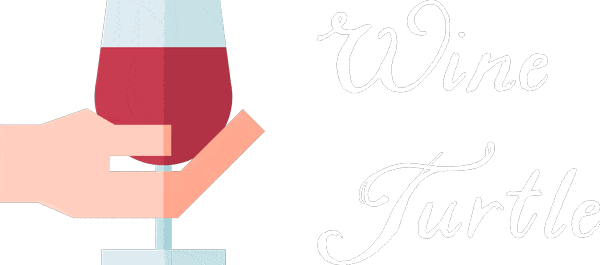How Long Does Opened Wine Last? [Red & White Explained]
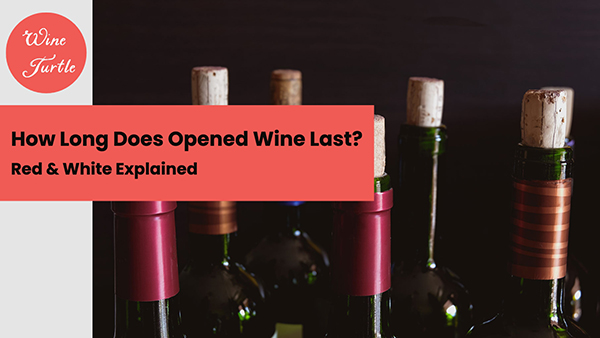
When it comes to drinking wine, few things are as disappointing as discovering a great bottle you opened a few nights ago has quietly turned into vinegar soup.
In this, guide I'll explain how long each variety of wine lasts once opened. I'll also explain how you can ensure your opened wine remains in tip-top condition for as long as possible, and how you can identify wine that's past its best.
So, how long is opened wine really good for? How do you tell if opened wine has gone bad?
Let's find out!
Why Does Opened Wine Go Bad?
When an opened bottle of wine is exposed to air, it begins to oxidize, a process that can eventually turn a vibrant, flavorful wine into a flat, sour mess.
A little oxygen is usually beneficial to a wine and this is why we decant bold and tannic red wines and allow them to breathe and open up. However, you should only decant what you intend to drink at that time. Too much oxygen exposure is bad news!
The process called oxidation eventually causes ethanol (alcohol) to turn into acetic acid, giving wine a vinegar-like taste. Vinegar itself is actually a combination of acetic acid and water.
Heat and light are also enemies of wine. Wine should be stored at a cool temperature, especially after opening. Storing opened wine in a fridge causes the oxidation process to slow.
There are other ways to extend the life of an opened bottle of wine and I'll explain how later in this guide.
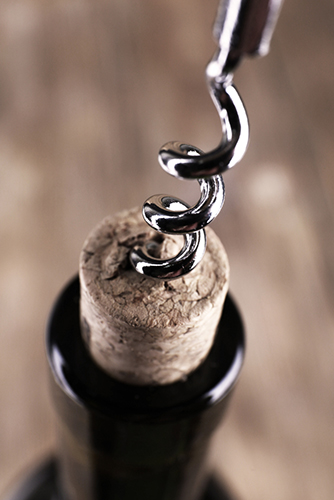
How Long Does Wine Last After Opening?
An opened bottle of wine can last anywhere from 3 to 5 days, depending on the type of wine and how it's stored.
In some cases, light white and rosé wines can remain drinkable for up to a week after opening when stored in the refrigerator. While full-bodied white wines tend to oxidize more quickly, lasting about 3 to 5 days.
An opened bottle of red wine, on the other hand, can last 3 to 5 days in a cool, dark place.
Fortified wines like Port or Sherry have the longest shelf life, lasting a few weeks or even months after opening.
However, the true test must be done with your palate and you should review each wine on an individual basis.
Personally, I don't like keeping a bottle of light white like Sauvignon Blanc for more than 24 hours as I feel that just a little bit of extra acidity ruins the balance of the wine quite dramatically. I'm much more comfortable keeping a bottle of red for a few days though and I frequently do.
How Long Does Red Wine Last After Opening?
Here's a general guideline on how long different types of opened red wine can last under various conditions.
I think you'll find my guidelines to be a bit less generous than elsewhere, but in my experience it's best to be slightly conservative.
Bold Reds (such as Cabernet Sauvignon, Syrah, and Bordeaux blends):
Medium-Bodied Reds (such as Merlot, Sangiovese, and Zinfandel):
Light-Bodied Reds (such as Pinot Noir and Beaujolais):
What's a Coravin?
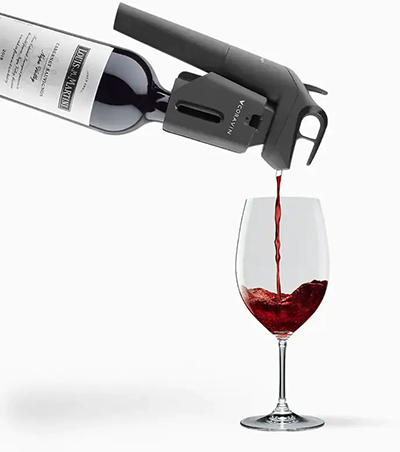
A Coravin Wine Preservation System allows you to pour wine without removing the cork. It can significantly extend the life of your wine by preventing oxygen exposure.
Coravin systems are used to preserve expensive bottles of wine in restaurants. They're really amazing gadgets, however, they are expensive to use.
These days there are many options within the Coravin range that can make wine last even longer. The latest iteration called the Coravin Timeless allows an opened bottle of wine to last for years!
How Long Does White Wine Last After Opening?
Light-Bodied White
Opened light-bodied white wines, such as Pinot Grigio or Sauvignon Blanc, can last for 2 days when stored in the refrigerator with a cork.
These are usually pretty delicate wines and changes can sometimes be noticeable after just a few hours. Oxidation is certainly noticeable in the form of increased acidity after 24 hours. You may notice the fruitiness becoming less pronounced too.
I know people that can drink these wines a few days after opening but personally, I never open a bottle unless I know it will be finished within 24 hours!
Full-Bodied White
Full-bodied white wines, such as Chardonnay, can typically last for 3-5 days in the fridge with a cork.
Since some of these types of wine saw more oxygen exposure during the winemaking process, they are especially vulnerable to oxidation once opened.
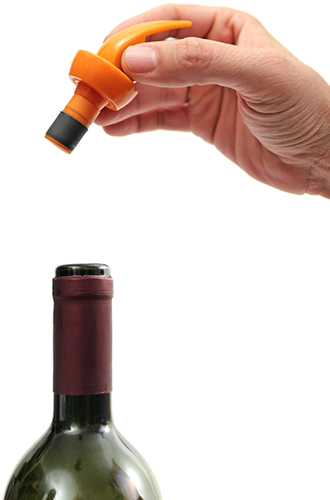
Sparkling Wine
Sparkling wines, once opened, generally last about 1 to 3 days when properly stored in the refrigerator.
However, the longevity of an opened bottle can vary depending on the type of sparkling wine:
- Prosecco: This Italian sparkling wine is known for its light, fruity flavors. Once opened, a bottle of Prosecco can last 1-2 days in the refrigerator with a sparkling wine stopper.
- Cava: This Spanish sparkling wine is a bit more robust than Prosecco. An opened bottle of Cava can last 2-3 days in the refrigerator with a sparkling wine stopper.
- Champagne: This famous French sparkling wine is known for its complexity and richness. An opened bottle of Champagne can last 2-3 days in the refrigerator with a sparkling wine stopper.
Without a special stopper to seal your sparkling wine, I'd advise drinking it all there and then. Otherwise, you'll lose the vibrant effervescence that they're known for very quickly.
Related: Don't miss our dedicated guide to storing opened bottles of Champagne.
Rosé Wine
Rosé wine is most similar to light-bodied white wines in style and also in how long it keeps once it has been opened.
These wines tend to be delicate, fresh, and acidic. Therefore, their balance can be thrown off quite easily by a little oxidation.
Fortified Wine
Fortified wine comes in many distinct styles. Here's how long the most popular fortified wines should be kept after opening.
Dessert Wine
Dessert wines, including specific varieties like Ice Wine and Sauternes, can last for a varying amount of time once opened. Here's a general guideline:
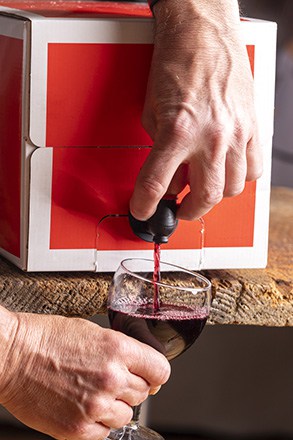
Boxed Wine
Boxed wine, once opened, can last for about 2 to 3 weeks. This is significantly longer than a traditional bottle of wine, which usually lasts only a few days once opened.
The reason boxed wine lasts longer is because of its packaging design. The wine is stored in a plastic bag within the box, and as you pour the wine, the bag collapses, limiting the amount of air that can come into contact with the wine. Air exposure is what typically causes wine to go bad.
Factors That Affect Opened Wine Turning Bad
There are several factors that can cause a wine to go bad once it's opened. By limiting them you can help your opened bottle of wine last longer. Here are the main causes:
- Oxygen Exposure: When wine is exposed to air, a process called oxidation occurs. This can alter the flavor and aroma of the wine, often leading to a flat or stale taste. Over time, excessive exposure to oxygen can turn wine into vinegar.
- Heat: Wine is very sensitive to temperature. Ideal storage temperatures for wine are between 45°F (7°C) and 65°F (18°C). A wine exposed to high temperatures can "cook," resulting in flat aromas and flavors.
- Light: Particularly sunlight, can pose a problem for long-term storage of wine. The UV rays can degrade and prematurely age wine.
- ABV and Sugar Content: Wines with higher alcohol content (ABV) or sugar content can often last longer after being opened. Both alcohol and sugar act as natural preservatives. This is why fortified wines like Port or sweet wines can last for several days or even weeks after opening.
Related: Not all bad wine is salvageable but there are ways to make a wine taste better.
How to Tell if Wine Has Gone Bad
The signs that a wine has gone bad can be detected through its appearance, smell, and taste. These are the tell-tale signs:
Remember, a wine that has gone bad won't hurt you if you taste it, but it might not be enjoyable to drink.
How to Store Wine Once Opened
Give your wine the best chance possible by following best practices to prolong its freshness for longer.
Here's a quick look at how you can help your wine fight off the evil effects of oxygen for longer!
- Re-cork the Wine Correctly: After pouring a glass, always replace the cork. It might seem easier to insert the clean side of the cork into the bottle, but it's better to reinsert the stained side. The clean side could introduce new contaminants that might spoil the wine.
- Store in the Fridge: All wines benefit from being stored in the fridge after opening. The cool temperature can't stop the wine from oxidizing, but it can significantly slow down the process.
- Use a Wine Preservation System: There are several wine preservation systems available that can help prolong the life of an opened bottle of wine. Two popular options are the vacuum pump system and the inert wine gas preservation system. The vacuum pump system, such as the Vacu Vin, works by removing air from the bottle and resealing it, which can keep the wine fresh for up to two weeks. The inert wine gas preservation system, like the Coravin, works by replacing the wine removed with argon gas. This method can keep the wine fresh for even longer, but it's a much more expensive option.
- Store Upright: Storing the bottle upright minimizes the surface area of the wine that's exposed to air, which can help prevent oxidation.
- Avoid Light and Heat: Wine should be stored in a cool, dark place to prevent it from going bad. Exposure to light and heat can cause the wine to oxidize faster.
Don't miss our guide on how to store opened wine for a more detailed explanation.
FAQs About Keeping Opened Wine
What is the shelf life of an opened bottle of wine?
The shelf life of an opened bottle of wine varies depending on the type of wine. Generally, lighter wines like white and rosé can last for 2 or 3 days when properly stored in the refrigerator. Red wines can last up to 5 days if stored in a cool, dark place with a wine stopper. Fortified wines like port and sherry can last up to a month after opening.
How can I tell if my opened wine has gone bad?
There are a few signs that your wine has gone bad: the smell is off (vinegar smell is a common one), the color has changed (white wine becomes darker, red wine becomes brownish), or the taste is flat or off.
Does all wine go bad after being opened?
Yes, all wines will eventually go bad after being opened because they are exposed to oxygen. This process, known as oxidation, can alter the flavor and color of the wine.
How can I extend the life of my opened wine?
There are a few ways to extend the life of your opened wine. One is to use a wine preserver, which removes the air from the bottle and seals it to prevent further oxidation. Another is to store the wine in the refrigerator, which slows down the oxidation process.
Does the type of wine affect how long it lasts after being opened?
Yes, the type of wine does affect how long it lasts after being opened. Lighter wines like white and rosé don't last as long as bolder red wines. Fortified wines like port and sherry can last up to a month after opening.
Can I get sick from drinking old opened wine?
Drinking old opened wine is unlikely to make you sick, but it may not taste very good. The wine will have undergone oxidation, which can cause it to taste flat or off.
Can opened wine be stored at room temperature?
It's best to store opened wine in the refrigerator, even red wines. This slows down the oxidation process and helps the wine last longer.
What can I do with wine that's been opened too long? If your wine has been opened too long and has started to go bad, you can still use it for cooking. The flavors can enhance sauces, stews, and marinades.
Takeaways
- The length of time your opened bottle of wine will stay in good condition depends on the variety of wine.
- It also depends on the storage conditions.
- Recork your wine as soon as possible and store it upright in the refrigerator. Oxygen is the enemy!
- Generally speaking, your opened wine will last 2-3 days when stored in the fridge like this.
- Alternatively, if your budget allows, use a vacuum stopper to eek out a few days more or a Coravin wine preserver to make a wine last a few more weeks or even months!
